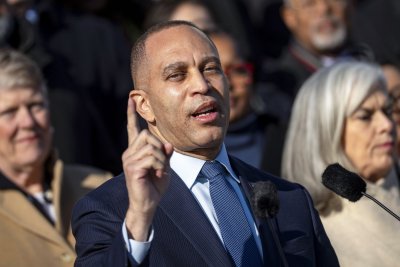Jeffries vows to ‘pressure’ Senate on health care insurance subsidies

Dec. 21 (UPI) — House Minority Leader Rep. Hakeem Jeffries, R-N.Y., said Sunday that he expects lawmakers to pass a bipartisan compromise on extending Affordable Care Act tax credits.
Jeffries said on ABC News’ “This Week” that lawmakers will pass a bi-partisan compromise to extend ACA tax credits extension in the House, potentially forcing Senate Republicans hand on health insurance subsidies for at least 22 million Americans who will face higher premiums in the new year.
Congress adjourned for Christmas without reaching a deal on extending on the tax credits, which Jeffries promised that House lawmakers will address in early January.
“That will put pressure on John Thune and Senate Republicans to actually do the right thing by the American people, pass a straightforward extension of the Affordable Care Act tax credits, so we can keep health care affordable for tens of millions of Americans who deserve to be able to go see a doctor when they need one,” Jeffries said.
Democrats have said if the two sides are unable to reach a deal on an extension, they will wield it against Republicans in next year’s midterm elections.
Rep. Pat Ryan, D-N.Y., has said access to affordable health care remains among the most pressing issues among voters.
“It’s just pathetic,” Ryan said. “The last time there was a major national Republican effort to repeal the ACA, we had an overwhelming wave where they got absolutely wiped out, and I think that’s likely what will happen here again.”
A handful of centrist Republicans in vulnerable congressional districts bypassed the authority of House Speaker Mike Johnson to team up with key Democrats to authorize a vote on a three-year tax credit extension when the House returns to Washington the week of Jan. 5.
Some Republican leaders have said they favor allowing Covid-era tax credits that made health care more affordable for millions of Americans to expire or be phased out over several years. Other members of the GOP, however, have said they favor extending the credits for longer.
By a vote of 51-48 Thursday, the Senate rejected a three year ACA extension with four Democrats joining the GOP to vote it down.
